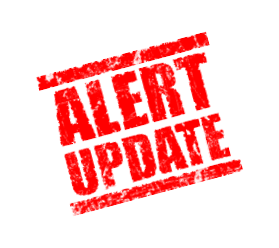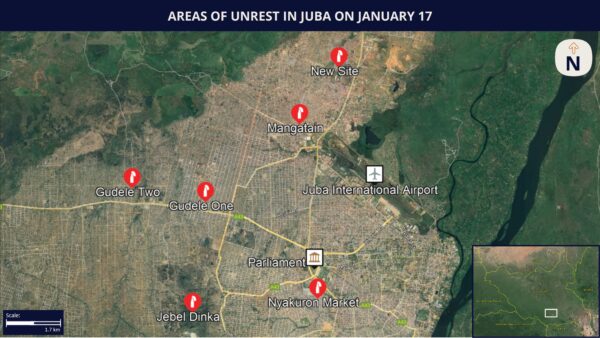18
Jan 2025
8:51 UTC
South Sudan Alert (UPDATE): President Salva Kiir calls for calm, restoration of law, order after nationwide protests per January 17 statement
Current Situation
- According to an official statement, President Salva Kiir called on citizens to remain calm after protests against the killing of South Sudanese nationals in Sudan turned violent in Juba and in other cities on January 17.
- In Juba, unrest was recorded in the neighborhoods of Gudele One, Gudele Two, Mangatain, Jebel Dinka, New Site, and Nyakuron market. A bolstered security deployment was reported in Juba after calm was restored.
- Authorities claimed that at least three people had been killed and seven wounded on January 16 in Juba, when youths in several suburbs looted and vandalized shops belonging to Sudanese nationals. Authorities reportedly rescued 45 Sudanese traders in Juba, who are currently being housed at a secure police facility.
- In Bor, Jonglei State’s capital, at least 16 people were reportedly injured, and 58 Sudanese nationals are currently under government protection. Violence was also reported in Aweil, the capital of Northern Bahr el Ghazal State.
Source: President Kiir’s statement
Assessments & Forecast
- This follows the imposition of an indefinite nationwide nighttime curfew on January 17 following protests and widespread unrest over the killing of South Sudanese citizens by the Sudanese Armed Forces (SAF) and allied groups after they recaptured Wad Madani in Sudan’s Gezira State from the Rapid Support Forces (RSF) on January 12. Human rights groups operating in Sudan accused the SAF of ethnically targeting South Sudanese civilians perceived to be supporting the RSF and claimed that at least 29 South Sudanese nationals were killed. The South Sudanese public was incensed by these killings, prompting the protest. However, the evolution of the protest into unrest indicates their heightened sentiments, explaining the targeted attacks on Sudanese-owned businesses and houses. The violence was likely a direct result of the public’s heightened frustrations and was intended to be highlighted as a form of retaliation against Sudan for the brutal treatment of South Sudanese citizens.
- The authorities’ prompt response to the unrest is likely intended to reassure international stakeholders about the safety of foreigners in South Sudan. This is also evidenced by the authorities’ prompt provision of protection to South Sudanese citizens. However, the government likely seeks to balance this with the protesters’ concerns. This is evidenced by the South Sudanese Ministry of Foreign Affairs summoning the Sudanese ambassador to discuss the issue of the safety of South Sudanese nationals in Sudan on January 14. However, Sudan dismissed the attack on South Sudanese nationals in Wad Madani as an isolated incident, likely to preserve diplomatic relations and hedge against international criticism.
- FORECAST: Despite this, the developments also feed some tensions between the two neighboring nations, although bilateral relations are unlikely to severely deteriorate. Given their shared history, the two countries host a large diaspora of each other’s nationals. To that end, both countries are likely to engage in dialogue to resolve the issue through diplomatic channels, to prevent ongoing tensions from escalating further, and to protect their diaspora. Given the heightened tensions within South Sudan, additional protests, and associated unrest due to violence against Sudanese nationals could recur over the coming days. However, the bolstered security presence alongside the curfew may enable the authorities to promptly restore calm in urban centers such as Juba. This could include the use of forcible measures to disperse protesters. The government may also impose restrictions on the gathering of bigger groups in Juba, other major towns, and near border areas where the number of Sudanese settlements remains higher. Tensions over the issue will likely remain heightened given the SAF’s heightened threat perception towards South Sudanese nationals in Sudan, which could prompt additional targeted violence against the diaspora and consequently fuel tensions in South Sudan.
Recommendations
- Those operating or residing in South Sudan, including in Juba, on January 18 and over the coming days are advised to avoid nonessential travel over the coming days due to the heightened potential for further unrest and associated security crackdowns.
- Remain cognizant of the developing situation and adhere to government directives.
COUNTRY RISK LEVEL
High
AFFECTED AREA
Juba; Nationwide, South Sudan
INCIDENT RISK LEVEL
High
STRENGTH OF SOURCE
Confirmed
Current Situation
- According to an official statement, President Salva Kiir called on citizens to remain calm after protests against the killing of South Sudanese nationals in Sudan turned violent in Juba and in other cities on January 17.
- In Juba, unrest was recorded in the neighborhoods of Gudele One, Gudele Two, Mangatain, Jebel Dinka, New Site, and Nyakuron market. A bolstered security deployment was reported in Juba after calm was restored.
- Authorities claimed that at least three people had been killed and seven wounded on January 16 in Juba, when youths in several suburbs looted and vandalized shops belonging to Sudanese nationals. Authorities reportedly rescued 45 Sudanese traders in Juba, who are currently being housed at a secure police facility.
- In Bor, Jonglei State’s capital, at least 16 people were reportedly injured, and 58 Sudanese nationals are currently under government protection. Violence was also reported in Aweil, the capital of Northern Bahr el Ghazal State.
Source: President Kiir’s statement
Assessments & Forecast
- This follows the imposition of an indefinite nationwide nighttime curfew on January 17 following protests and widespread unrest over the killing of South Sudanese citizens by the Sudanese Armed Forces (SAF) and allied groups after they recaptured Wad Madani in Sudan’s Gezira State from the Rapid Support Forces (RSF) on January 12. Human rights groups operating in Sudan accused the SAF of ethnically targeting South Sudanese civilians perceived to be supporting the RSF and claimed that at least 29 South Sudanese nationals were killed. The South Sudanese public was incensed by these killings, prompting the protest. However, the evolution of the protest into unrest indicates their heightened sentiments, explaining the targeted attacks on Sudanese-owned businesses and houses. The violence was likely a direct result of the public’s heightened frustrations and was intended to be highlighted as a form of retaliation against Sudan for the brutal treatment of South Sudanese citizens.
- The authorities’ prompt response to the unrest is likely intended to reassure international stakeholders about the safety of foreigners in South Sudan. This is also evidenced by the authorities’ prompt provision of protection to South Sudanese citizens. However, the government likely seeks to balance this with the protesters’ concerns. This is evidenced by the South Sudanese Ministry of Foreign Affairs summoning the Sudanese ambassador to discuss the issue of the safety of South Sudanese nationals in Sudan on January 14. However, Sudan dismissed the attack on South Sudanese nationals in Wad Madani as an isolated incident, likely to preserve diplomatic relations and hedge against international criticism.
- FORECAST: Despite this, the developments also feed some tensions between the two neighboring nations, although bilateral relations are unlikely to severely deteriorate. Given their shared history, the two countries host a large diaspora of each other’s nationals. To that end, both countries are likely to engage in dialogue to resolve the issue through diplomatic channels, to prevent ongoing tensions from escalating further, and to protect their diaspora. Given the heightened tensions within South Sudan, additional protests, and associated unrest due to violence against Sudanese nationals could recur over the coming days. However, the bolstered security presence alongside the curfew may enable the authorities to promptly restore calm in urban centers such as Juba. This could include the use of forcible measures to disperse protesters. The government may also impose restrictions on the gathering of bigger groups in Juba, other major towns, and near border areas where the number of Sudanese settlements remains higher. Tensions over the issue will likely remain heightened given the SAF’s heightened threat perception towards South Sudanese nationals in Sudan, which could prompt additional targeted violence against the diaspora and consequently fuel tensions in South Sudan.
Recommendations
- Those operating or residing in South Sudan, including in Juba, on January 18 and over the coming days are advised to avoid nonessential travel over the coming days due to the heightened potential for further unrest and associated security crackdowns.
- Remain cognizant of the developing situation and adhere to government directives.


